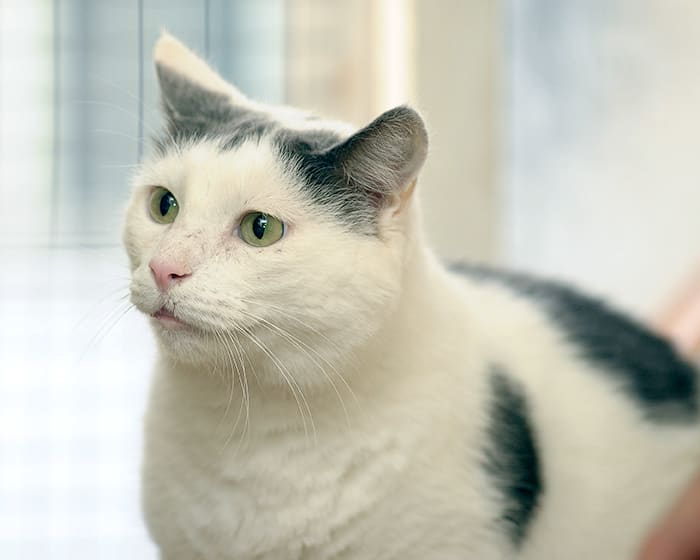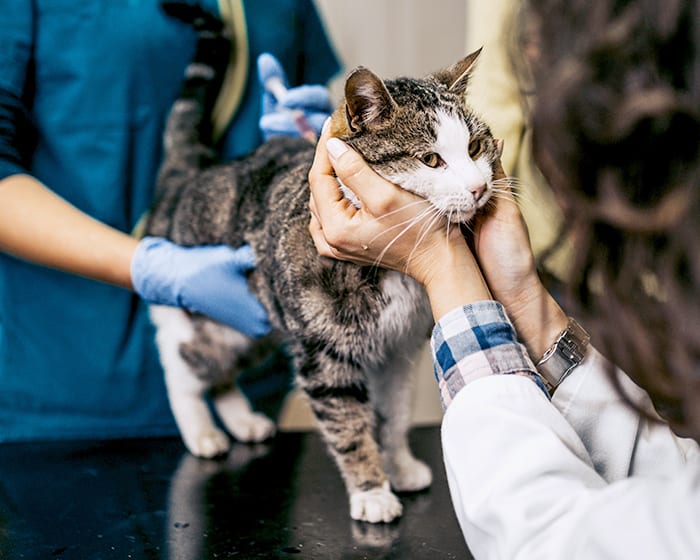Hyperthyroid Treatment for Cats
Hyperthyroidism is a common disease in cats and is primarily seen in cats middle-aged and older. Our veterinarians offer specialized treatment options to help your cat get back to their best health.
What is Hyperthyroidism?
Feline hyperthyroidism is the most common endocrine disorder in cats. It is often caused by a benign tumor of the thyroid gland that produces too much of the thyroid hormone.
The body's metabolic rate increases dramatically, forcing the body to work much harder than normal. Clinical signs of the disorder vary from mild to severe. Hyperthyroidism can also mask certain underlying diseases such as kidney failure.
Symptoms can include weight loss, behavioral changes, increased appetite and vocalization, rapid heart rate and other issues. Treatment options can include surgery, anti-thyroid medications and injectable radiation therapy (Radioactive Iodine 131 Therapy).

Treatment Options for Hyperthyroidism in Cats
There are many treatment options for hyperthyroidism in cats, including surgery, medication and I-131 radiation therapy. While each approach has its pros and cons, most veterinarians agree that I-131 (injectable radioactive Iodine 131 Therapy) is the curative treatment of choice. Ask your primary veterinarian about a referral for this treatment.

FAQs About I-131 Hyperthyroid Treatment
- What is I-131 Radiation Therapy?
This therapy has been used extensively in veterinary medicine and boasts a success rate between 95 and 98% for hyperthyroid cats with only one treatment.
Radioactive iodine is absorbed into abnormal thyroid tissue, leaving nearby normal thyroid tissue and other organs undamaged. After the benign tumor has vanished, your cat's normal thyroid tissue will usually resume functioning within a month of therapy.
I-131 therapy does not require general anesthesia or surgery. Though the injection is simple, your cat will need to be hospitalized for four days following treatment.
Less than 5% of cats become hypothyroid (produce too little of the hypothyroid hormone) and require daily supplements as a result of treatment.
- Why does my cat have to remain hospitalized for so long after treatment?
Though there is only one single subcutaneous injection with I-131 radiation therapy, cats will remain radioactive until the isotope decays.
The radioactive material remains in the cat's body and is primarily excreted through urine and feces. Federal and state laws require us to "hold" or hospitalize a cat until the radioactivity levels he or she is emitting are too low to be harmful. Cats can typically be released after four days, though some cases may require an extended stay.
- What will happen during my cat's hospital stay?
While hospitalized, your cat will be kept in an isolation area here at Veterinary Specialty Center of Tucson and cannot be visited, petted or held by owners until they are discharged (though we can give you daily progress updates). He or she will be monitored daily by a trained staff member, as well as a veterinarian.
Medications will be administered as needed, and we encourage you to bring a week's supply of your cat's favorite food.
Unfortunately, no personal effects can be returned so we suggest not bringing any cat toys or bedding (we will provide these).
Because the radioactive material remains in the cat’s body and is excreted primarily through the urine and feces, your cat is required by state law to remain in our facility until his/her levels are considered low enough for discharge.
The standard hospital stay is about four days, though some cases may require an extended stay. While hospitalized, your cat will be monitored daily by a trained staff member as well as a veterinarian.
Because of these isolation requirements, cats with serious non-thyroidal illnesses (chronic renal failure, diabetes, heart failure, etc.) are not good candidates for I-131 radiation therapy.
- What is required following discharge from the hospital?
For two weeks following your cat's discharge from hospital, we request you follow some basic safety measures while your cat's body is excreting any remaining radiation.
We will provide detailed written instructions which will include limiting extensive contact (especially with children or pregnant women), washing your hands after handling your cat or his/her litter box, and disposing of litter box waste. Your cat will also need to remain indoors during this time.
- Will my cat experience radiation sickness?
The treatment is administered via a subcutaneous injection, similar to a vaccination. They do not experience radiation sickness. Radioactive iodine is a very safe and effective treatment and is frequently used in human medicine.
- How do I schedule an appointment for I-131 therapy for my cat?
Please talk with your veterinarian about your cat’s case and whether he or she is an appropriate candidate for I131. Veterinary Specialty Center of Tucson can work closely with your veterinarian to provide the best possible care for your cat. We prefer a referral from your veterinarian before we see your cat for evaluation or treatment.
